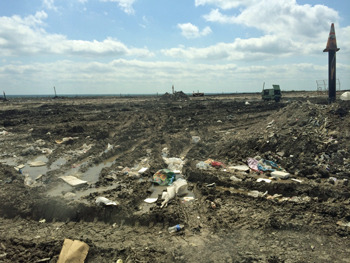My advice to students considering Bass Connections—other than to seize this unique and worthwhile opportunity—is to be flexible as the project evolves.
Degree
Environmental Sciences and Policy '16
I grew up in Wilmington, North Carolina, and attended Eugene Ashley High School. I was fortunate to have some great options for college, and I chose Duke because I felt it offered tremendous investment in the undergraduate experience, an emphasis on applying knowledge in the service of society and an innovative and challenging curriculum. Bass Connections is evidence of all these great qualities.
Academically, personally and professionally, I am interested in environmental health and environmental justice. I heard about this project team by inquiring about research opportunities with a professor, Dr. Deb Gallagher, who has experience with environmental justice issues. She explained that she was assembling a Bass Connections team that would use PhotoVoiceas a qualitative research method to document environmental benefits and burdens (including a major landfill, pictured below) in a low-income, predominantly African American community in Dallas, Texas.
At that time, I was also taking a class with another of the team’s terrific faculty leaders, Dr. Rebecca Vidra. I was thrilled when they invited me to come on board.

This project yielded some invaluable insights. I realized several barriers to catalyzing change in environmental justice communities that I would not have fully grasped without this on-the-ground experience. It challenged many preexisting notions, and questioned assumptions as seemingly basic as what the environment actually encompasses. Working alongside team members from many different disciplines brought an enlightening diversity of perspectives as we wrestled with these questions. I also learned a lot about myself and where I see my role in rectifying environmental injustices.
The project prepared me for my work this summer at the public interest environmental law firm Earthjustice, where I worked primarily on environmental justice cases. I’m now considering law school or other ways to use the power of the law to engender a healthier and more just society.
The relationships I built were by far the most rewarding aspect of the Bass Connections experience. I really appreciated the opportunity to get to know my professors and fellow students on a personal level, and to hear how the issues involved in this project intersect with their life paths. I also met a number of dynamic and inspiring individuals who have a deep and admirable passion for their community.
My advice to students considering Bass Connections—other than to seize this unique and worthwhile opportunity—is to be flexible as the project evolves. It may not entail exactly what you think it does at the outset, but if you have patience and keep investing yourself in it, you can learn even more than you thought you would, and help effect positive change while doing so.